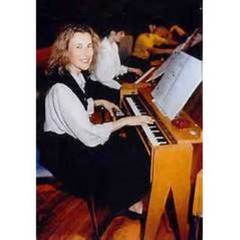|
Back
Pathopoeia! New York
David Geffen Hall, Lincoln Center
03/10/2016 - & March 11, 12, 2016
Olivier Messiaen: Turangalîla-Symphonie
Yuja Wang (Pianist), Valérie Hartmann-Claverie (Ondes Martenot)
New York Philharmonic Orchestra, Esa-Pekka Salonen (Conductor)

E.-P. Salonen/Y. Wang (© New York Philharmonic)
Pathopoeia is rarely deserved. Last night’s performance of Oliver Messiaen’s Turangalîla-Symphonie was pathopoeia incarnate.
The word describes an art which arouses the emotions. The Greeks used it in terms of oratory. Yet the musical oration of Messiaen, his laudation of love and joy and adoration and meditation and–what conductor Eka-Pekka Salonen called “the dance of the galaxies”–was so vivid, so gripping, that for 70 minutes, David Geffen Hall was totally mesmerized.
This was not Hare Krishna music or the lulling spirituality of John Luther Adams. This Turangalîla-Symphonie (Messiaen’s neologism means tempo/speed and life force) was gripping both in its velocity and, in the most sensuous music since Tristan and Isolde, the Baudelaire-sounding “Garden of the Sleep of Love”. This was an illusion of sleep, for the somnolence brought forth a tenderness almost of foreplay, produced by vibraphone and celesta ornaments, and of course Messiaen’s bird calls.
Maestro Salonen began with a galloping speed, slowing down when necessary, then continuing, and allowing pianist Yuja Wang to play both incredible cascades, percussive accents and two amazing cadenzas.

V. Hartmann-Claverie
Most breathtaking, though, although it was composed written almost 60 years ago, both conductor Eka-Pekka Salonen and Ondes Martenot player Valérie Hartmann-Claverie had worked personally with Messiaen. Mr. Salonen had been his student, Ms. Hartmann-Claverie had played her important instrument for the composer, garnering his thoughts on this most important addition.
Mr. Salonen, perhaps the second finest musical raconteur after WQXR’s John Schaefer, offered a trenchant introduction which gave away the secret. That Messiaen had not given us his picture (the way a blockbuster movie pounds out its message), but rather, he creates a landscape, and we must bring ourselves to this landscape, finding whatever we want to find.
Some critics note the “Balinese” element, natural because of the celesta vibraphone, piano and other percussion. Trust me, this is not Balinese gamelan, or even “Hindu” music, whatever that mean. (I.e. this is not ”Messiaen’s Raga-Time Band.”). Others see it as a massive construction so gigantic that it can’t hold together.
Even Stravinsky, the inventor of massive 20th Century music, said it could only be written “by somebody with a lot of ink.”
And the critic quoted in the program notes who said that George Gershwin was a tune-writer was correct. Except that tunes had nothing to do with it.
What I brought to this landscape was first, as a critic, an unbounded praise both for the conductor and pianist. Mr. Salonen was precise and graphic, his command total, his excitement contagious. As for Yuja Wang...well, she is not (if she ever had been) a “Chinese pianist” any more than Ashkenazy is a “Jewish pianist”. More than command of these almost unplayable unstopping notes, she brought herself to this music, her ebullience belying the difficulty. This was true in her cadenzas, but also in the Baroque-type music she played in “The Development of Love”.
The word “enthusiasm” means, of course, the breath of god, and Messiaen’s god–whether Catholic, Hindu or Love–was essential to Ms. Wang’s enthusiasm.
Secondly, I was astounded at the orchestration of this work. Numerous times heard on recording, and once live (see CODA below), the Philharmonic produced the most shimmering string sounds. The brass (including a piccolo trumpet) was brassy. Those lonely clarinet notes by Anthony McGill were like lone calls from far away. A cooing from the forest.
Yet above all, it was Messiaen’s handling of the percussion instruments, the color he achieved through celesta, glockenspiel, vibraphone (played with magnificent character by Daniel Druckman), the appropriately-named Ms. Hartmann-Claverie and of course Yuja Wang. Those who hear this work as a massive tapestry (which it is) don’t understand the sensitivity, the almost adoring gentleness with which he treats his instruments.
Only two people actually walked out halfway, but for the life of me, I couldn’t see how that was possible. This was not dodecaphonic or atonal, or even jagged. The harmonies were carefully woven together as a Bukhara carpet, and the color was…well, I guess you could say it was Technicolor at times. But it was also shadowy color, as sexual as Goya, as chaste as Raphael...
Enough of the comparison already! We have two more performances, and I am tempted to sneak in tonight to hear it again. Messiaen’s Turangalîla-symphonie is the opposite of Apocalyptic music. Within its 70 minutes, the composer has essays and variations on a single theme: the theme of Radiance. Last night, the proponents provided the awe-inspiring flames.
CODA: My last experience with this work was less than felicitous. While David Geffen Hall was not the most perfect venue (Ms. Hartmann-Claverie’s instrument was sometimes hidden), it was perfect compared to the horrible acoustics of the Hong Kong Concert Hall, which musicians loathe.
Sir Simon Rattle performed the Messiaen in that terrible place (audio engineers were called in after it had been built), and where I was sitting, the Ondes Martenot bore into my ears like a dentist’s drill. That was hardly Sir Simon’s fault, but he was, I heard, rather incensed that I titled my review ”The Penny-Whistle From Hell”.
This, thank Messrs Salonen, Wang and Hartmann-Claverie, was an offering from beyond the celestial spheres.
Harry Rolnick
|